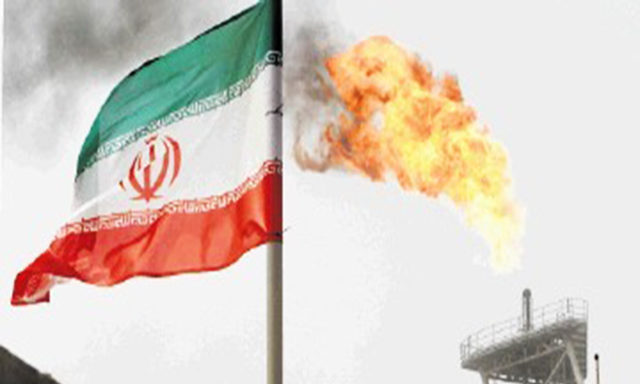
With tensions over its roles in Yemen, Iraq and Syria already high, Iran is flexing its military muscle in the Persian Gulf.
For the third time in as many weeks, Islamic Revolutionary Guard Corps patrol boats have fired at or aggressively tailed commercial vessels in the Gulf and the Strait of Hormuz, the No. 1 global choke point for oil transit.
“You have to go back to 1988, toward the end of the Iran-Iraq war, to see such actions,” said Alex Vatanka, a senior fellow at the Middle East Institute in Washington.
“It’s a signal that Iran is powerful, and if action is taken against its interest, Iran can retaliate in the Persian Gulf.”
The increased aggressiveness reflects tensions between hard-liners and more moderate factions in Iran’s political system, and comes amid rising tensions over conflicts in the Mideast pitting Shiite Iran against Saudi Arabia and other Sunni Arab nations, whose leaders met Thursday in Maryland with President Barack Obama.
It also is occurring as Iran is in the final stage of negotiations with the US and five other world powers over a deal to curb the Islamic Republic’s nuclear program.
In the latest incident, Iran on Thursday fired warning shots across the bow of a Singapore-flagged ship, the Alpine Eternity, after it refused to heed demands to move into Iranian waters, a US defense official said.
The confrontation stemmed from a financial dispute over damage the ship caused to an Iranian oil platform, said the official, who spoke on condition of anonymity because he wasn’t authorized to discuss details.
The Alpine Eternity, a tanker that carries oil products, was attacked in international waters near the UAE coast, according to MTI Network, a company representing Transpetrol, its manager.
The ship was sailing in ballast to the port of Fujairah to load a cargo, Pat Adamson, MTI’s chairman, said by phone. There were no injuries to the crew of 22 or 23 on board, Adamson said.
Late last month, four Iranian patrol boats tailed a U.S.- flagged merchant ship, the Maersk Kensington, for about 20 minutes in a manner the captain interpreted as aggressive, before they ended their pursuit, the US defense official said.
Days later, Iran seized control of a Marshall Islands-flagged ship, the MV Maersk Tigris, after firing warning shots across its bow, over what Iran said was a commercial dispute over undelivered cargo.
Iran’s seizure of the Maersk Tigris on April 28 prompted the US Navy to begin accompanying US-flagged vessels through the Strait of Hormuz. That mission ended after about a week.
The biggest test of Iranian muscle-flexing could come next week, when an Iranian cargo ship is scheduled to arrive at a port in Yemen despite a naval blockade of Yemeni ports imposed by Saudi Arabia as it seeks to combat Houthi rebels that the Saudis say are backed by Iran.
Iran’s navy said Tuesday it is escorting a shipment of food, medicine and drinking water to Yemen, where humanitarian concerns are mounting after more than a month of Saudi-led airstrikes.
The cargo ship is expected to arrive at Yemen’s northern Red Sea port of Hodeidah on May 20, Iran’s national television reported.
Last month, a nine-ship Iranian convoy bound for Yemen reversed course rather than risk a confrontation with US Navy ships monitoring its passage.
“The return of the convoy was very embarrassing, and it was very public,” said Afshon Ostovar, a senior analyst at CNA Corp. and adjunct professor at Johns Hopkins University’s Kreiger School who studies Iran. “The leadership had to respond.”
While taking the unusual step of firing on commercial ships, Iran is picking its targets carefully, each time claiming a financial dispute as justification.
In the latest case, the Alpine Eternity accidentally struck an Iranian oil platform and damaged it on March 22, the US defense official said.
Iran told the shipping company it must pay for damage to the oil platform, a dispute that apparently remains unresolved, the official said.
“Iran is playing a game that is apparent to those it’s playing with but conducted under legal pretense,” Ostovar said. “The Iranians have done their homework. They knew which ship to attack and how to justify their action.”
The more aggressive posture also comes amid a fight inside Iran’s inner circle for influence over foreign policy, said Scott Lucas, an Iran analyst and professor of international relations at Birmingham University in the UK.
While the Revolutionary Guard Corps is aligned with political hard-liners, Iranian President Hassan Rouhani and Foreign Minister Javad Zarif “don’t want Yemen to hold up better relations with the Saudis,” Lucas said.
A confrontation in the Gulf could disrupt the nuclear talks, Lucas said, even though Iranian and US negotiators have tried to keep them insulated from the regional conflicts.
“If we have a major confrontation over an Iranian cargo ship, then there’s no way you are going to insulate the talks,” Lucas said.